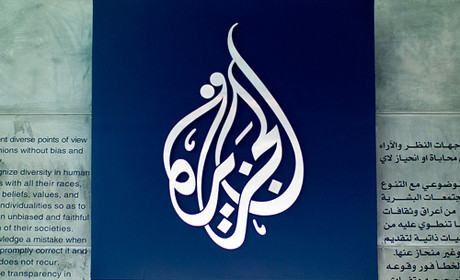
Complaint against Al Jazeera's English-language channel not upheld by Ofcom, which found significant public interest in contested documentaries
Credit: Joi on Flickr. Some rights reserved.Ofcom has ruled that Al Jazeera English (AJE) did not breach broadcasting regulations in its coverage of the Palestine Papers - secret diplomatic documents concerning the Israeli-Palestinian conflict which were leaked to the network.
The papers, which contained minutes of meetings between representatives from the US, Israel and the Palestinian Authority, were the subject of a four-part documentary series aired by AJE and Al Jazeera's Arabic channel.
A complaint was lodged against AJE on behalf of the Palestinian Liberation Organisation (PLO) by Dr Saeb Erakat. Erakat, who as chief negotiator for the Palestinian Authority was present at meetings detailed in the leaked documents, complained to Ofcom that the programmes had breached his privacy in airing details from stolen documents.
He also complained that the programme makers had treated him unfairly by omitting important contextual information and presenting excerpts from negotiations he had been involved in out of context.
Al Jazeera defended the programmes, claiming that reasonable care had been taken to ensure the facts were presented carefully. It said that reporter Clayton Swisher had met with the original source of the leaked papers, and that their authenticity had been confirmed by US and British intelligence officials.
Al Jazeera also said that it had contacted a number of people within the PLO, including Erakat, in advance of airing the documentaries with an offer to participate, but that they had all refused.
The network also denied the allegation that it had omitted important contextual information, claiming that its publication of the full Palestinian Papers online meant that all the relevant information was available to the audience.
Ofcom sided with Al Jazeera (see PDF report, p. 56), ruling that there was "significant public interest" in details of the leaked documents being aired by the programmes. The regulator also decided that the four-part documentary series did not omit contextual information, that dramatic reconstructions did not portray Erakat unfairly, and that he and the PLO were given sufficient time to take part and after they refused their position was represented.
Erakat resigned from the Palestinian Authority in the wake of the leak.
Ahmad bin Jasem Al Thani, director general of Al Jazeera, said: "This is a resounding vindication of our journalism, our decision to release the papers, and our handling of it.
"We recognize that presenting this volume of information was bold for a television channel. However, the worldwide positive reaction to the series, and this latest judgment, shows that we handled it in an informative and responsible manner.
"Ofcom's decision on the claim of an infringement of privacy is a particularly important one. It is the job of journalists to challenge the decisions taken by people in positions of public accountability, and to shine a light in the corridors where important decisions are being taken."
Free daily newsletter
If you like our news and feature articles, you can sign up to receive our free daily (Mon-Fri) email newsletter (mobile friendly).
Related articles
- IMPRESS warns news publishers against hate speech towards LGBTQ+ groups
- How Dow Jones is tackling AI copyright challenges
- 15 free sources of data on the media industry
- Building a better future for public interest news
- Big tech platforms' market power is "significantly overestimated", new paper finds









